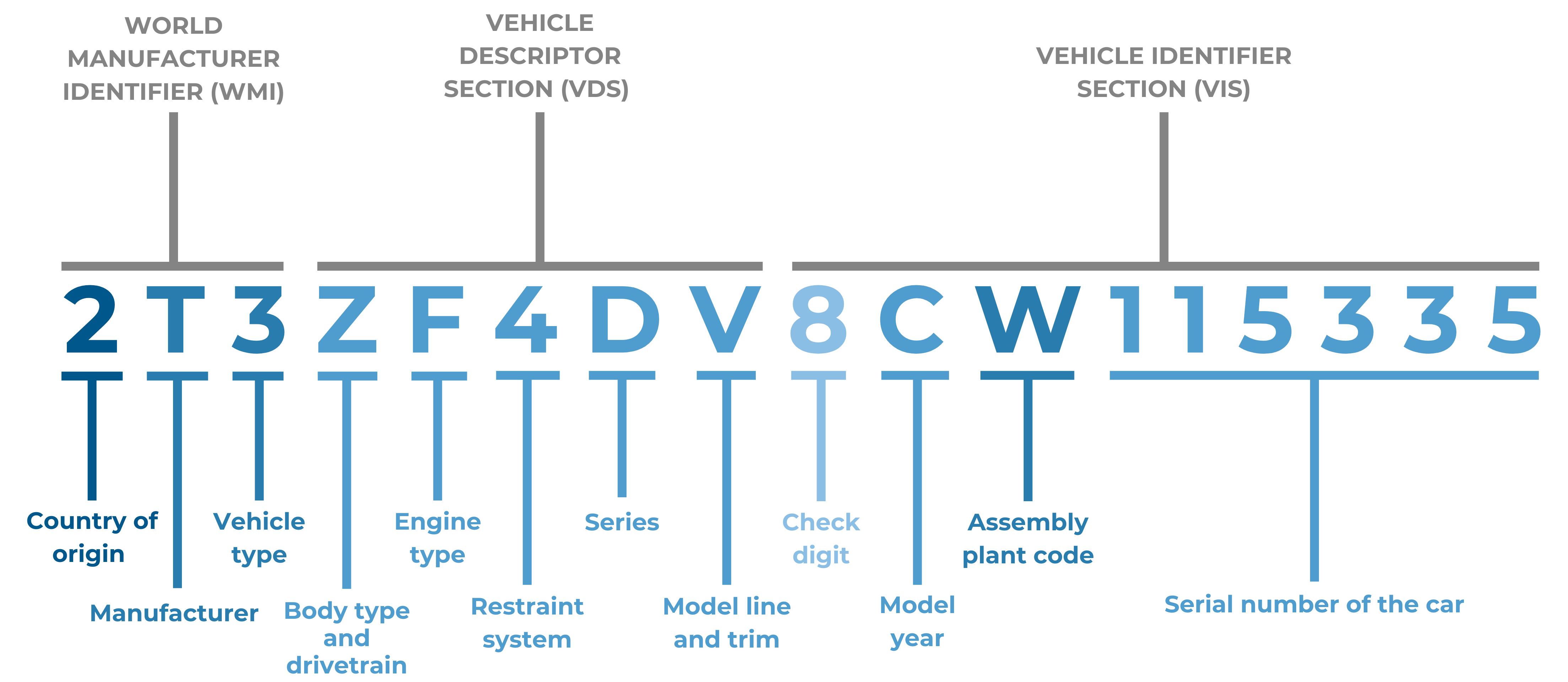
A Toyota VIN checker (AKA Toyota car VIN check) gives buyers, sellers, and owners important information about a car’s history. If you’re buying a used Toyota, this check helps you confirm its essential records. On the other hand, if you’re selling, it ensures all details are accurate and up-to-date. No matter your reason, doing a Toyota VIN number check free of charge or paid is always a smart decision. So, what exactly does it reveal? Let’s break it down step by step.
First, know before you tow! Run a Toyota car VIN check to uncover hidden problems or issues.
What is a Toyota VIN?
A Toyota VIN, or Vehicle Identification Number, is a special 17-character code for each car. Think of it as a fingerprint for the vehicle. This code tells you important details about where the car was made, its features, and even its history.
You can find the VIN in three main places.
- First, look on the driver’s side dashboard.
- If it’s not there, check the area inside the driver’s door frame.
- Lastly, you can find the VIN on car registration, title, insurance, bill of sale, and owner’s manual.
Understand the VIN Structure
A Toyota VIN consists of three key sections:

- World Manufacturer Identifier (WMI) – Positions 1-3
- 1st: Country of origin (e.g., 2 for Canada)
- 2nd: Manufacturer (e.g., T for Toyota)
- 3rd: Vehicle type (e.g., 1 for passenger car)
- Vehicle Descriptor Section (VDS) – Positions 4-8
- 4th: Body type and drivetrain
- 5th: Engine type
- 6th: Restraint system
- 7th: Series
- 8th: Model line and trim
- Vehicle Identifier Section (VIS) – Positions 9-17
- 9th: Check digit
- 10th: Model year (e.g., 9 for 2009, A for 2010, B for 2011)
- 11th: Assembly plant code
- 12-17th: Serial number of the car
What Can a Free Toyota VIN Check Reveal?
A Toyota car VIN check gives you important details about the car’s history, condition, and value.
Manufacturing Information
- Make, Model, and Year – Confirms the car’s identity, ensuring you get the right details.
- Production Plant – Shows where Toyota built the vehicle, helping trace its origin.
- Engine Type and Transmission – Lists key mechanical details, including horsepower and fuel type.
- Trim Level & Features – Identifies factory-installed options, such as navigation, sunroof, or premium sound.
Recall Details
- Open Recalls – Alerts you to safety issues that Toyota hasn’t fixed yet.
- Safety Campaigns – Lists manufacturer-initiated service programs to improve performance or fix defects.
Accident & Damage History
- Reported Collisions – Shows past accidents recorded in insurance and police databases.
- Structural Damage – Flags possible frame or body damage, which affects safety and resale value.
- Airbag Deployment – Reveals if airbags deployed in past crashes, which may indicate serious damage.
Theft & Title Status
- Stolen Vehicle Check – Warns if the car was reported stolen but never recovered (similar to NICB).
- Salvage Title – Indicates if an insurer declared the car a total loss due to damage.
- Rebuilt Title – Confirms if the car was repaired after major damage and approved for road use.
Safety Ratings & Reliability
- Crash Test Ratings – Displays safety scores from NHTSA and IIHS-HLDI, helping you assess protection levels.
- Reliability Reports – Shows long-term dependability based on owner feedback and industry studies.
Warranty Information
- Factory Warranty Status – Determines if original coverage is still active for repairs or defects.
- Extended Warranty Coverage – Reveals eligibility for extended service plans, which help cover future repairs.
- Powertrain & Corrosion Protection – Details coverage for the engine, transmission, and rust protection.
Liens & Financial History
- Outstanding Loans – Warns if the vehicle has unpaid loans that could lead to repossession.
- Title Brand Issues – Identifies financial encumbrances, including lease or fleet ownership.
Market Value & Ownership Costs
- Current Market Value – Estimates the car’s worth based on condition, location, and demand.
- Depreciation Trends – Predicts future resale value, helping you make a smarter investment.
- Ownership Costs – Provides insights into fuel efficiency, insurance rates, and expected maintenance expenses.
How to Get a Free Toyota VIN Check
You can check a Toyota’s VIN for free in several ways. The best methods include the following:
1. Toyota’s Official Website
Toyota offers a free VIN lookup tool. To use it, enter the VIN and check for open recalls. This helps keep your car safe by providing updates on necessary repairs and manufacturer alerts.
2. Auto Dealerships & Toyota Service Centers
Most authorized Toyota dealerships provide free Toyota car VIN check in the form of car reports. Because of this, you can verify recall and warranty details before purchasing or servicing a vehicle. This extra step ensures you make informed decisions.
3. National Highway Traffic Safety Administration (NHTSA)
The NHTSA recall database helps you find any outstanding recalls. All you need to do is enter the VIN on their free VIN check. After that, the tool shows the latest safety defect information, helping you stay updated on potential risks.
4. VinCheck.info
VinCheck.info offers a free Toyota VIN check. It includes recalls, title history, and theft records. This tool is useful for buyers and owners. It helps verify a vehicle’s past before making a purchase.
5. National Insurance Crime Bureau (NICB)
The NICB’s VINCheck database helps spot stolen or salvaged vehicles. Used car buyers can rely on this tool. It protects them from scams and fraud.
6. DMV State Agencies
Some state DMVs provide free VIN lookup services or equivalents. These checks can reveal title branding, odometer readings, and past sales timelines.
By using these free tools, you can check a Toyota’s history and cross-check sources. This helps you avoid scams and make a smarter decision.
Why Use a Toyota Car VIN Check Before Buying?
Checking a Toyota’s VIN before buying a used car is essential. It helps you:
- Avoid buying a stolen or salvaged vehicle, which can lead to legal trouble.
- Confirm if the seller’s claims about the car’s history are accurate and trustworthy.
- Spot warning signs like odometer fraud, past severe accidents, or major repairs.
- Ensure that all safety recalls have been addressed to keep the car safe.
- Verify past ownership records, title status, and any possible legal issues.
- Check for open liens that could lead to unexpected financial problems later.
- Identify whether the car was once a rental, taxi, or fleet vehicle.
- Confirm factory specifications and original equipment to avoid surprises.
- Compare the VIN report with the car’s actual condition to detect hidden problems.
- Gain stronger negotiating power by knowing potential issues before making a deal.
Final Thoughts
A Toyota VIN number check free (or paid) tool is helpful because it lets you verify a car’s history. Plus, it helps you avoid safety risks while also preventing costly mistakes. Free reports provide useful insights, yet paid VIN checks often uncover more details about accidents and maintenance records.
Before you hit the road, make sure your Toyota truck’s past won’t leave you stranded—run a VIN check today.